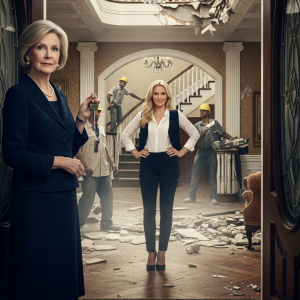The beginning of the end started years ago, in the stifling quiet of a mahogany-paneled law office. The air was thick with the scent of old paper and unexpressed grief. The Sterling family had gathered for the reading of the patriarch’s will, a final decree from a man who had forged an empire, Sterling Manufacturing, with his own two hands.
Carter, then as now, was a peacock in a room of crows. He sat straight-backed, a smug, predatory confidence radiating from him. He was the heir apparent, the one who had shadowed his grandfather, the one who talked loudest about market share and hostile takeovers.
Across from him sat his cousin, Alex. Quieter. A watcher. The family saw him as a dreamer, a well-meaning but ultimately soft detour from the Sterling bloodline.
The lawyer cleared his throat and read the will’s primary clause. “To my grandson, Carter Sterling, I bequeath my majority share and controlling interest in Sterling Manufacturing. May he lead it with the strength and vision it deserves.”
A collective, subtle sigh of relief went through the room. The proper order of things had been maintained. Carter’s chest puffed out, a triumphant smirk playing on his lips. Then came the clause for Alex. “To my grandson, Alex Sterling, I bequeath the sum of ten million dollars, to be used as he sees fit, for his future and his ventures.”
Pitying glances were cast Alex’s way. It was a generous sum, of course, but it was just money. It wasn’t the company. It wasn’t the legacy. It was a consolation prize, a gentle push out of the nest. Carter leaned over and patted Alex’s shoulder with condescending magnanimity. “Don’t worry, cousin. There will always be a place for you at the company. Maybe in marketing.”
Alex said nothing. He just nodded, his face an unreadable mask of calm. After the family had dispersed, the lawyer handed Alex a second, private envelope. “Your grandfather asked me to give this to you when we were alone.”
Inside was a single sheet of his grandfather’s heavy, cream-colored stationery. The familiar, forceful handwriting was a voice from the grave. Alex, it read. I have given Carter the crown, but I have given you the sword. The cash is your seed. Your proving ground. Carter has the ambition of a king, but the judgment of a spoiled prince. One day, that ambition will threaten to burn down this family’s legacy. He will falter. Be ready to protect it. Not for me, but for the family’s name. I am not betting on the company. I am betting on you.
And so, Alex took the sword and vanished from the family’s expectations. His twenties were a series of quiet, unspectacular “failures” that became family lore. At Thanksgiving, an aunt would ask with a syrupy, concerned tone, “Oh, Alex, darling, I heard your little data analytics startup didn’t quite work out. Don’t you worry, dear. You’ll find your footing eventually.”
Carter, holding court by the fireplace, would laugh loud enough for the whole room to hear. “He’s collecting failed businesses like they’re baseball cards! At least he’s passionate about something, right?” The family’s polite, complicit laughter was a constant reminder of his designated place in their hierarchy: the harmless, unsuccessful dreamer.
They had no idea that each “failure” was a self-funded, low-risk tuition payment in the brutal school of venture capitalism. They didn’t know about the successes, because the successes were never under his name. They were under the umbrella of a silent, brutally efficient private equity firm he’d founded with his grandfather’s seed money: North Ridge Capital.
Meanwhile, Carter’s reign at Sterling Manufacturing was, on the surface, a golden age. He was on the cover of business magazines, hailed as a bold visionary. He flaunted a lifestyle that screamed success: a Gulfstream jet, a collection of hypercars, a penthouse overlooking Central Park.
At a recent family charity gala, Carter had arrived in a new Italian sports car that cost more than a house, boasting about the company’s performance. “Record profits, fourth quarter in a row,” he announced to a circle of fawning relatives. “We’re leaner, meaner, and more profitable than ever. Grandfather would be proud.”
Alex stood at the edge of the circle, nursing a glass of water. He had just reviewed Sterling Manufacturing’s quarterly financials that morning. The report on his desk, locked in the encrypted servers of North Ridge Capital, showed a 15% drop in revenue and a dangerously ballooning debt-to-equity ratio. The new Ferrari, Alex knew, had been financed by the latest emergency loan his firm had quietly extended to the company—a loan personally guaranteed by Carter, using his controlling shares as collateral.
For a year, Alex had been the silent, anonymous lender of last resort, the faceless creditor keeping the family legacy from collapsing under the weight of his cousin’s incompetence and greed. He was a study in stillness at these events, a fixed point in the swirling chaos of his family’s empty chatter. They mistook his silence for defeat. He knew it was camouflage. He was a chess master, watching with cold patience as his arrogant opponent moved his king into the open, one foolish, extravagant move at a time.
The annual Sterling family portrait was a tradition as old and unyielding as the granite bluffs on which their Hamptons estate was built. It was an exercise in performative unity, a carefully composed image of dynastic strength to be sent out on Christmas cards and hung in the halls of Sterling Manufacturing.
This year, the atmosphere was particularly charged. Carter, radiating the self-importance of a man who believed his own press, directed the affair as if it were a board meeting. He positioned his parents, his wife, and his children near the family matriarch, his grandmother, creating a clear solar system of power with himself as the sun.
Alex stood off to the side, waiting to be told where to go. He had almost declined the invitation, but he knew his absence would be noted and misconstrued as petulance. His presence, however, seemed to be an irritant to Carter, a single dissonant note in his perfectly composed symphony of success.
The photographer, a high-strung man hired for his prestige, was trying to arrange the outer circle of cousins and aunts. “Mr. Sterling,” he said to Alex, gesturing vaguely. “Perhaps you could stand just behind your uncle?”
Before Alex could move, Carter’s voice boomed across the manicured lawn, sharp and cutting. “Whoa, whoa. What are you doing here?” He pointed a finger at Alex, who had naturally moved toward the center of the second row. The entire family turned to look.
“The center is for the people who actually contribute to this family, Alex,” Carter sneered, his voice dripping with disdain. He reveled in the public stage, in the silence of the family that gave him tacit permission to be cruel. “Failures don’t belong in the center. Get to the edge.”
A suffocating silence fell. Alex’s parents flushed with a mixture of anger and shame but said nothing. His aunts and uncles shuffled their feet, their eyes suddenly finding the distant horizon fascinating. A few of the younger cousins offered weak, nervous laughs, eager to align themselves with the center of power.
Alex’s face was a mask of placid indifference. There was no flicker of anger, no hint of humiliation. He met Carter’s triumphant gaze for a brief, cold moment. Then, without a word, he turned and began the long, silent walk from the near-center of the group to the furthest possible position on the end.
Each step was deliberate, measured. It was not the shuffling walk of a defeated man, but the steady, rhythmic pace of a judge ascending to the bench. The family watched, their discomfort palpable. His quiet compliance was more unsettling than any angry outburst could have been.
He reached the very edge of the frame, standing slightly apart from the last cousin, a visual footnote to the grand Sterling narrative. The photographer, flustered, cleared his throat. “Okay, everyone! Big smiles! One… two… three!”
The flashbulb popped, capturing the image forever: the Sterling family, triumphant and united, with the quiet failure relegated to the margin.
The moment the photographer lowered his camera, Alex turned and walked away. He didn’t wait for the pleasantries or the post-photo cocktails. He strode across the lawn onto the stone veranda overlooking the Atlantic, the ocean breeze a cool balm against the stuffy atmosphere of the family gathering.
He pulled out his phone and dialed a single number. It was answered instantly. “Jessica? It’s Alex.”
He paused, looking out at the endless, powerful expanse of the sea. “Activate the covenant breach clause on the Sterling Manufacturing loan portfolio. The default is triggered. Seize the collateralized shares.”
He listened for a moment. “That’s correct. All of them. The transfer of ownership is to be executed by market open tomorrow. No, Jessica, no questions. It’s done.”
He ended the call, slipped the phone into his pocket, and watched as a wave crashed against the shore below. The tide was turning.
The first tremor of Carter’s earthquake hit at 7:30 a.m. the next morning. It was small, insignificant, yet deeply irritating. Standing in his favorite artisanal coffee shop, he tried to pay for his $8 latte with his corporate American Express Centurion card.
“Sorry, sir. It’s been declined,” the barista said, her tone a flat, indifferent pronouncement of his momentary inconvenience.
Carter scoffed, annoyed at the public indignity. “That’s ridiculous. It’s an unlimited corporate card. Run it again.”
She did. The result was the same. “Declined.” Fuming, he paid with cash and stormed out, making a mental note to fire someone in accounting for the embarrassing oversight.
The second tremor hit when he arrived at the gleaming skyscraper that housed Sterling Manufacturing. He strode through the lobby, giving a curt nod to the security guards, and swiped his key card at the executive elevator bank. A small red light blinked back at him. Access Denied.
He tried again. Red light. A cold knot of confusion began to tighten in his stomach. He was the CEO. This was his building. He took the main elevator to the executive floor and found the thick glass doors to his office suite locked. His card wouldn’t open them.
It was from his phone, standing impotently in the hallway outside his own office, that he saw the third and final shockwave. An email had just been sent to every single employee in the company, from the board members to the mailroom clerks. It was from the Board of Directors.
Subject: Urgent Announcement of Leadership Transition
To All Employees,
This email is to inform you of a significant and immediate change in the ownership and leadership structure of Sterling Manufacturing. Due to a default on major financial covenants, a controlling block of shares, formerly held by Carter Sterling, has been legally transferred in full to the company’s primary creditor, North Ridge Capital.
Carter’s blood ran cold. North Ridge Capital? The faceless lender? How could they have that much power? He scrolled down, his thumb trembling.
Effective immediately, North Ridge Capital, as the new majority shareholder, has reconstituted the Board. We are pleased to announce the appointment of its sole partner as the new Chairman and Chief Executive Officer of Sterling Manufacturing: Mr. Alex Sterling.
The name seemed to hang in the air, an impossible, hallucinatory typo. Alex? His failed, pathetic cousin Alex? It made no sense. This was a nightmare. A prank.
Rage, pure and blinding, replaced his confusion. He stormed toward the main boardroom, where he could see a meeting was already in progress. He didn’t knock. He shoved the heavy oak doors open with such force that they banged against the stoppers.
The room fell silent. The entire board was seated around the long, polished table. And at its head, in the chairman’s seat—his grandfather’s seat, his seat—sat Alex. He was dressed in a perfectly tailored dark grey suit, a stark contrast to the casual, almost shabby way he usually appeared at family functions. He looked calm, powerful, and utterly in command.
Alex was in the middle of a sentence, but he paused, slowly turning his head to look at his stunned, panting cousin standing in the doorway. The room was so quiet Carter could hear the frantic pounding of his own heart.
For a long moment, Alex just looked at him, his expression unreadable. Then, a flicker of something—not a smile, but a cold acknowledgment—appeared in his eyes.
“You were right, Carter,” Alex said, his voice quiet yet carrying to every corner of the silent room. “Failures do belong on the edge.”
He made a small, dismissive gesture toward the open door through which Carter had just stormed.
“Your new position is on the other side of that door. Security will see you out.”
The destruction of Carter Sterling was as swift and total as it was silent. He was escorted from the building by two security guards, men who had previously greeted him with deferential nods. He was allowed to retrieve a single box of personal items from his office, which was already being cleared out by an anonymous-looking facilities team. As he walked through the lobby, stripped of his title, his power, and his identity, he was just another man carrying a cardboard box. He was a ghost in the empire he had thought he ruled.
The financial fallout was apocalyptic. With the seizure of his shares, he lost not only his control of the company but his entire net worth. The income stream that funded the jet, the cars, and the penthouse vanished. He was left with nothing but the mountain of personal debt he had accrued to maintain the illusion of his own genius. The failure he had mocked now owned his past, his present, and his future.
The power dynamic in the Sterling family was violently and permanently inverted. The following Sunday, at the traditional family dinner, the seating arrangement told the new story. Alex sat at the head of the table, in the seat that had belonged to his grandfather. Carter was not present. He hadn’t been invited.
The aunts and uncles who had laughed at Carter’s cruel joke at the photo shoot were now models of deference. They addressed Alex with a hushed, anxious respect. They asked for his guidance, his opinion on the market, his plans for the company that underpinned their own comfortable lives. Their laughter from the week before was a ghost in the room, a sour memory of their own poor judgment. They were paying tribute to a king they had spent twenty years mistaking for a fool.
For Carter, the psychological annihilation was the most devastating blow. His entire identity was built on a foundation of his superiority over Alex. He was the winner, Alex the loser. He was the center, Alex the edge. Now, by every conceivable metric—wealth, power, influence—he was the failure. He was forced to watch from the outside as Alex, with quiet competence, began to undo the damage Carter had done to the company. Alex wasn’t just a better businessman; he was a better leader, respected by the employees Carter had ruled through fear.
Weeks later, Alex sat alone in his new office—his grandfather’s office. On his desk was the framed family portrait from that fateful day in the Hamptons. He was still on the edge of the frame, a quiet figure on the periphery. But the context had changed everything. He was no longer an outcast. He was an observer, a guardian watching from the wings.
His actions had not been about revenge. They were about restoration. It was the fulfillment of a promise made to his grandfather in a silent letter years ago. He had protected the legacy. He had honored the bet his grandfather had placed on him. His quietness at the party had not been weakness; it was the profound calm of a man who knew the game was already over, and he was just waiting for the right moment to declare checkmate. He had never needed to be in the center of the picture. The position on the edge had simply given him the perfect view of the entire board.




